Coke Zero vs Diet Coke may seem pretty much the same when you first look at them. If you’re trying to cut back on sugar, you could go for either one. But remember, both of these drinks use artificial sweeteners, and some research says they might not be the best for your health.
If you drink a lot of regular soda, switching to types that use artificial sweeteners instead of sugar could help lower how much sugar you’re having. These sweeteners make things taste sweet without causing your blood sugar to go up like normal sugar does.
Diet sodas are one way to avoid the extra sugars that are in a lot of drinks. Lately, you might have seen sodas with “zero” on the label too. They’re another choice you’ve got. Coca-Cola makes both Diet and Zero kinds.
If you’re wondering what the difference is between Coke Zero vs Diet Coke and trying to decide which is better for you, let’s find out with DietHCG.
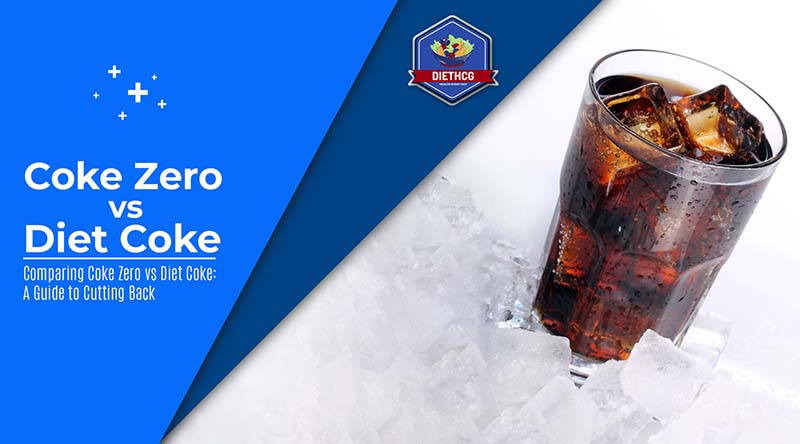
1. Nutritional Composition of Coke Zero vs Diet Coke
When comparing the nutritional content of Coke Zero and Diet Coke, both drinks offer similar benefits for those looking to reduce sugar intake, but there are a few key differences and similarities worth noting.
1.1. Nutritional Components of Coke Zero
- Carbonated water adds fizz.
- Caramel color for that classic cola look.
- Phosphoric acid for a tangy taste.
- Aspartame, a sweetener.
- Potassium benzoate keeps it tasting fresh.
- Natural flavors for that cola taste.
- Potassium citrate adjusts the acidity.
- Acesulfame potassium, another sweetener.
- Caffeine for a bit of energy.
Coke Zero also includes phenylalanine, making it unsuitable for people with phenylketonuria (PKU).
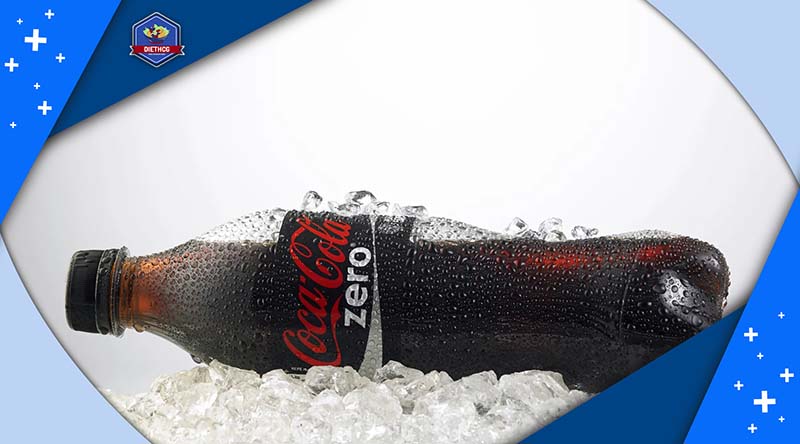
In a 12-ounce serving, Coke Zero has:
- No calories, fat, carbohydrates, or sugars.
- A small amount of sodium (40 mg) and potassium (60 mg).
- A moderate amount of caffeine (34 mg).
- It’s sweetened artificially, avoiding added sugars. Coke Zero is available in flavors like cherry, vanilla, and even caffeine-free versions.
1.2. Nutritional Components of Diet Coke
- The ingredients are similar, including carbonated water, caramel color, aspartame, phosphoric acid, and caffeine.
- It uses potassium benzoate and natural flavors, with citric acid instead of potassium citrate.
- Diet Coke also contains phenylalanine, posing the same risk to those with PKU.
A 12-ounce serving of Diet Coke includes:
- No calories, fat, carbohydrates, or sugars—similar to Coke Zero.
- It has a bit more caffeine (46 mg) compared to Coke Zero.
- Diet Coke also avoids added sugars by using artificial sweeteners and comes in unique flavors like ginger lime and feisty cherry, with a caffeine-free option available.
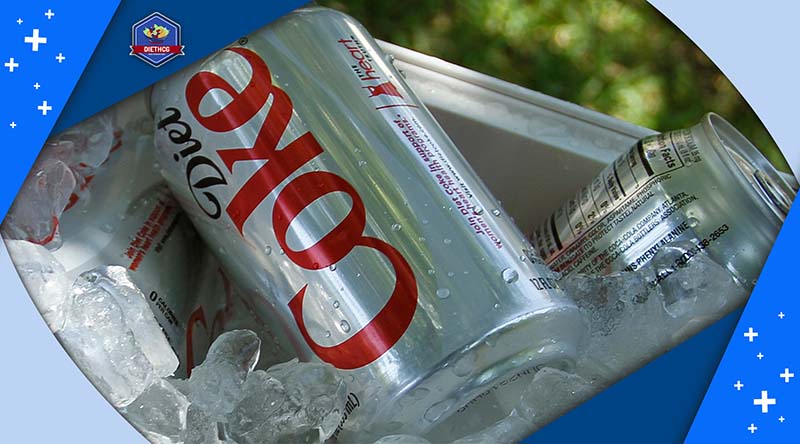
Both drinks are free from added sugars and are low in nutrients, making them calorie-free options for soda lovers. However, their artificial sweetener content, which includes aspartame and acesulfame potassium, calls for moderate consumption. Coke Zero offers a wider variety of flavors, while Diet Coke provides an option with Splenda (sucralose) and different flavor choices. Choosing between them might come down to personal taste preference or sensitivity to certain sweeteners.
2. Key Differences Between Coke Zero and Diet Coke
Coke Zero vs Diet Coke are both popular choices for those looking to avoid sugar in their beverages, but they do have some differences that might influence your choice between the two.
2.1. Sweeteners Used
One of the main differences is the type of artificial sweeteners they use. Diet Coke relies on aspartame alone for its sweet taste. Coke Zero mixes aspartame with acesulfame potassium (also known as Ace K or acesulfame K), a sweetener that also doesn’t add calories or raise blood sugar levels. Since ingredients are listed by how much of them are in the product, we can guess that Diet Coke might have less Ace K, making the sweetener blend one of the key distinctions.
2.2. Caffeine Content
Another difference is their caffeine levels. Coke Zero has a bit less caffeine than Diet Coke, but both are way below the 400 mg daily caffeine limit recommended for most adults. This difference in caffeine content might matter to those sensitive to caffeine or looking to limit their intake.
2.3. Taste
Perhaps the most subjective difference is the taste. Even though these drinks are designed to offer a sugar-free cola experience, some people feel strongly that one tastes more like regular cola than the other. This difference in taste preference could be due to the different sweeteners used or how each person’s taste buds react to the specific blend of ingredients in each drink.
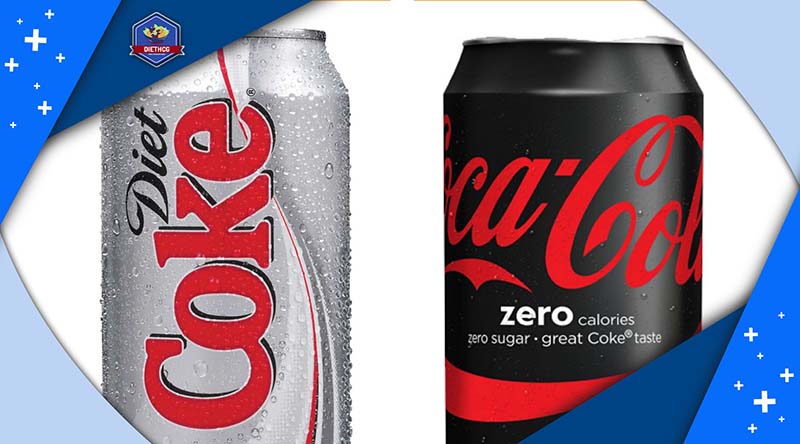
While Coke Zero and Diet Coke are quite similar in their goal to offer a no-sugar cola option, the blend of sweeteners used, caffeine content, and individual taste preferences are the key areas where they differ. Whether you prefer one over the other may come down to how sensitive you are to these factors.
3. Potential Side Effects
Drinking carbonated drinks like Coke Zero and Diet Coke in moderation generally doesn’t lead to harmful side effects for most people. However, the caffeine and artificial sweeteners in these beverages might have negative effects on some individuals, even when consumed moderately.
- Caffeine Content: The United States Department of Agriculture (USDA) suggests that adults should limit their caffeine intake to no more than 400 mg per day. This is roughly equivalent to four cups of coffee, or about nine to eleven 12-ounce cans of Diet Coke or Coke Zero, respectively. So, staying within moderate drinking limits of these sodas shouldn’t push you over the caffeine limit. But if you’re particularly sensitive to caffeine, it’s wise to monitor how much of these drinks you’re having, as they do contain a lower amount of caffeine.
- Aspartame and Headaches: Some people might find that aspartame, an artificial sweetener found in both beverages, can cause headaches. The American Migraine Foundation has recognized this potential side effect, although it varies from person to person. If you notice headaches after consuming drinks with aspartame, this ingredient could be the reason.
- Cancer Risk: There have been concerns and studies suggesting that aspartame could potentially be carcinogenic, but there’s also data that contradicts this. More comprehensive, long-term studies are needed to make a clear connection between aspartame consumption and cancer. The Food and Drug Administration (FDA), however, has deemed aspartame safe for consumption.
- Acesulfame Potassium: Like aspartame, acesulfame potassium (Ace K) has been scrutinized for potential carcinogenic effects. While some studies have explored this link, conclusive evidence is lacking, and more in-depth, long-term research is necessary. Acesulfame potassium is also approved by the FDA.
4. Coke Zero or Diet Coke: Which One Should You Choose?
Choosing between Coke Zero and Diet Coke really comes down to personal preference, as there isn’t a significant difference in their health impacts or nutritional values. Both beverages are similar in terms of their ingredient lists and caffeine amounts, meaning one isn’t inherently healthier than the other.
Diet sodas, including Coke Zero and Diet Coke, aren’t health drinks. They’re better viewed as occasional treats rather than daily staples. If you’re looking to reduce your intake of added sugars, switching from regular to diet soda can be a good first step.
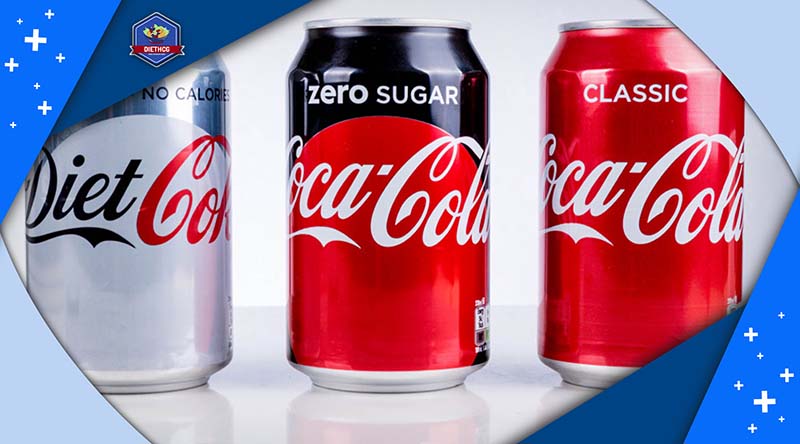
Your choice between the two might ultimately hinge on taste. Coke Zero is often said to mimic the flavor of the original Coca-Cola more closely. However, taste is subjective, and some people might find that they actually prefer the flavor of Diet Coke, even over regular Coke.
Whether you choose Coke Zero or Diet Coke, enjoy them in moderation while maintaining a balanced diet. Your decision should align with your taste preferences, as neither choice offers significant health benefits over the other.
5. Tips to Decrease Diet Soda Consumption
If you’re trying to cut back on diet soda and the artificial sweeteners they contain, there are several refreshing alternatives that can still satisfy your craving for a fizzy drink.
- Flavored Waters: Calorie-free and flavored waters are a great choice for staying hydrated without the added sugars or artificial sweeteners. They come in a variety of flavors, making them a tasty and healthy option for your daily hydration.
- Kombucha: Kombucha is not only a fizzy alternative to soda but also offers health benefits, including a boost to your gut health thanks to its probiotic content. Be mindful to check the sugar content, as some kombucha can have added sugars, though generally less than what’s found in regular sodas.
- Probiotic Sodas: Similar to kombucha, probiotic sodas offer the benefits of probiotics with the taste closer to that of traditional sodas, but with significantly less sugar. They can be a good way to transition from regular sodas to healthier options.
- Stevia Sodas: For those who don’t want to give up the sweet taste but wish to avoid artificial sweeteners, stevia sodas use natural sweeteners like stevia or monk fruit. These sodas deliver the sweetness and fizziness of regular sodas without the sugar or artificial ingredients.
- Sparkling Water: If you’re mainly in it for the fizz, sparkling water could be the perfect substitute. Unsweetened sparkling waters provide the carbonation you enjoy without sugar or sweeteners. For a hint of flavor, look for those infused with natural fruit essences.
6. Conclusion
If you’re looking to reduce your intake of added sugars, opting for sodas that use artificial sweeteners, such as Diet Coke vs Coke Zero, might appear to be a sensible option.
Despite some controversies surrounding the artificial sweeteners used in these beverages regarding potential adverse health impacts, enjoying these drinks in moderation is generally not worrisome, particularly when you consider the harmful effects associated with their sugary counterparts.
Nutritionally, Coke Zero vs Diet Coke are nearly identical, with the primary difference lying in their taste profiles.
For those interested in cutting down on both added sugars and artificial sweeteners, exploring alternatives like kombucha or probiotic sodas could be a beneficial choice.


